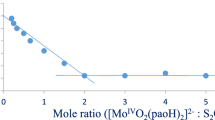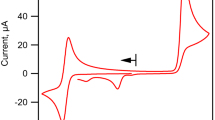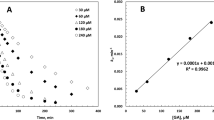Abstract
SOME two hundred papers dealing with the chemistry of triphenyltetrazolium chloride and its use as a redox-indicator have been reviewed by Ried1 and Smith2. In spite of its wide use in biology, up to the present little is known about its reducing mechanism, the influence of experimental conditions on it, on its redox-potential, etc., and therefore the results obtained with it are empirical in character. Investigations of the salt by means of polarography and spectrophotometry carried out in this laboratory revealed some aspects which should be considered when using it as a chemical indicator of reducing power in biological reactions.
This is a preview of subscription content, access via your institution
Access options
Subscribe to this journal
Receive 51 print issues and online access
$199.00 per year
only $3.90 per issue
Buy this article
- Purchase on Springer Link
- Instant access to full article PDF
Prices may be subject to local taxes which are calculated during checkout
Similar content being viewed by others
References
Ried, W., Angew. Chem., 64, 391 (1952).
Smith, F. E., Science, 113, 751 (1951).
Hausser, J., Jerchel, D., and Kuhn, R., Chem. Ber., 82, 195 (1949).
Jámbor, B., Acta. Chim. Acad. Sci. Hung. (in the press).
Author information
Authors and Affiliations
Rights and permissions
About this article
Cite this article
JÁMBOR, B. Reduction of Tetrazolium Salt. Nature 173, 774–775 (1954). https://doi.org/10.1038/173774b0
Issue Date:
DOI: https://doi.org/10.1038/173774b0
This article is cited by
-
Untersuchungen �ber den Einflu� der Wasserstoffionenkonzentration auf die Spezifit�t der TTC-Reaktion
Mikrochimica Acta (1966)
-
A Staining Technique for detecting Ratoon Stunting Disease in Sugar Cane
Nature (1958)
-
The microdetermination of reducing sugars in blood by means ofp-Anisyl tetrazolium blue
Mikrochimica Acta (1957)
-
Mechanism of the Reduction of Tetrazolium Salts
Nature (1955)
Comments
By submitting a comment you agree to abide by our Terms and Community Guidelines. If you find something abusive or that does not comply with our terms or guidelines please flag it as inappropriate.



